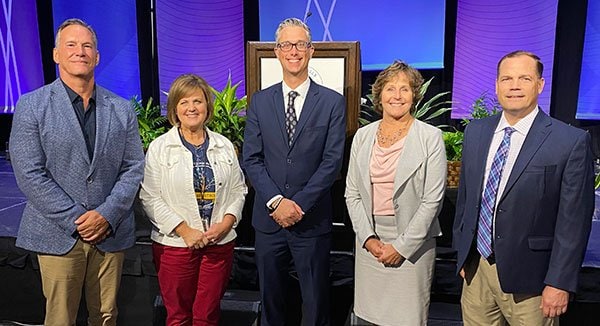Solving the Mental Health Crisis Through Community Partnerships
Mental health disorders can occur at any age, in many ways and can affect many aspects of your life.
It should come as no surprise then, that mental health is a major focus for health systems such as Avera.
Consider this:
- A person with depression will spend more on health care, is more likely to use the emergency room and be admitted to the hospital.
- 80 of the 86 counties Avera serves are in a mental health professional shortage.
- One in four people are diagnosed with a mental illness.
“Mental health is a critical component of our overall health and virtually every family is affected by it,” said Thomas Otten, Assistant Vice President of Avera Behavioral Health Services. “A mental illness can cost a life in a moment. Suicides continue to rise and with the COVID pandemic depression, anxiety and disordered eating have all skyrocketed.”
Avera cannot solve these challenges alone, so we seek out community partners to work outside of our clinic and hospital walls.
Our community partnerships include organizations such as:
Since mental health issues are so pervasive, Avera’s approach is diverse in working on everything from suicide prevention to improving access to mental health care and pinpointing depression earlier in children and teens.
“Our partnerships help us solve complex problems that are not easy to solve,” Otten said, explaining that Avera also works closely with Sanford Health and government officials to make headway in these areas.
These partnerships can be important in many ways. When someone calls the South Dakota Helpline, for instance, they are often referred to Avera, said Janet Kittams, Chief Executive Officer of Helpline.
Alternatively, Helpline also works to follow up with Avera patients once they leave Avera Behavioral Health Hospital, Otten said. They ensure people have rides to appointments and are getting their prescriptions filled, plus answer other questions after discharge.
In the Clinic
Access to behavioral health services has been a long-term focus for Avera in partnership with The Leona M. and Harry B. Helmsley Charitable Trust. This partnership has led to virtual care access across our footprint and most recently South Dakota’s first 24/7 Behavioral Health Urgent Care clinic – now open in Sioux Falls.
“We want to be easy to access and for everyone to know there is a place you can go 24 hours a day, seven days a week to find the right level of care,” Otten said.
Within Avera, most psychiatry providers are in larger cities such as Aberdeen and Sioux Falls. If you live in a small town, that makes access difficult, but the outcome can be severe, Otten said.
Take a child diagnosed with ADHD. Left untreated it can lead to more reckless behavior, which can lead to more accidents, Otten explained. School work becomes harder to concentrate on making dropping out more common.
“In the school district we’re trained to look at the child as a whole person — physical, mental and academics,” said Patti Lake-Torbert, Senior Counselor with Sioux Falls Schools. “We know if one of those areas is not healthy it is going to hold you back from successes in life.”
In the Schools
That knowledge led to a district-wide conference in partnership with Avera and the Department of Justice to educate teachers and administrators on depression and anxiety. The conference brought in licensed social worker and author Lynn Lyons to discuss how anxiety and depression can affect the person and the entire family. Participants also received information on how to spot it in the schools and refer students to get help.
While district staff are already educated on this issue, it was a good reminder on how to help not only students but fellow staff members, Lake-Torbert said.
“This gave us the time to get everyone in the same building and discuss how to talk with students and families and gave us the same vocabulary on the topic, which is important,” Lake-Torbert said. “Staff know how to identify anxiety in students, know how to help in the classroom, and whether it’s something that needs to be referred on.”

On Aug. 20, 2021, Avera partnered with the Sioux Falls School District to host a conference on mental wellness in children and youth. Pictured are officials from Avera Behavioral Health and Sioux Falls School District.
In the Community
The Helpline Center operates a call center that manages the statewide crisis line, which will switch from 1-800-273-8255 to the three-digit number of 988 on July 16, 2022. The Helpline Center will continue to answer the 211 phone number, which provides callers with connections to social service resources.
Their wide-ranging resource database puts them at the center of community needs in the area and helping people get the resources that may indirectly affect their health, whether its access to transportation, affordable housing or healthy foods.
“We’re uniquely positioned because of our resource database,” Kittams said. “Mental health has always been one of the top needs we see with our callers and that has continued. It’s probably increased since the pandemic because that created a lot of stress in people’s lives and we’re still coping with that in the aftermath.
These partnerships will continue to grow and expand as needs are identified.
“When opportunities arise to work alongside an agency it always accomplishes more than going it alone,” Otten said. “I wish suicides were going down and no one had depression, but I’m confident that if we didn’t have the partnerships we have in place with each individual agency trying to solve it alone, it would be considerably worse.”
See how Avera is working with communities across our footprint.
Learn More About Social Determinants of Health